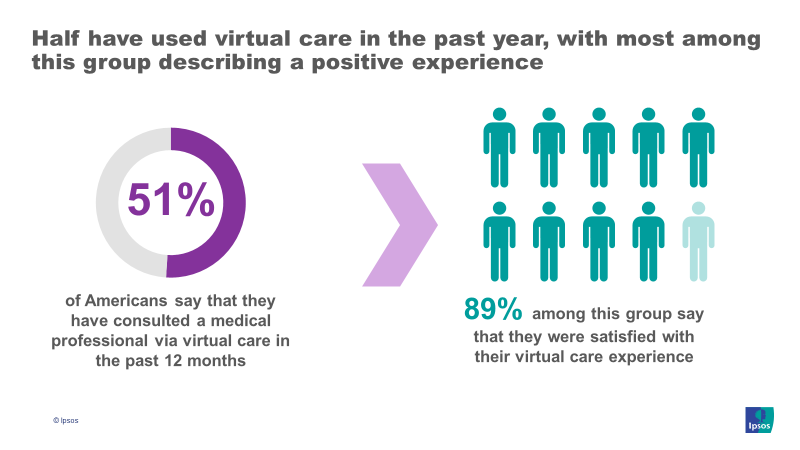Online features play key role in ‘ideal health care experience’
Washington, DC, March 5, 2021 — A new Evernorth/Ipsos poll among Americans finds that same day appointments are mentioned by half of Americans when describing their ‘ideal health care experience’ (53%). Online features also play a key role in creating this ‘ideal experience’ – particularly the ability to look up appointment availability, estimated costs, and research symptoms/action plans online. The survey found that 58% are comfortable with virtual consultations replacing in-person visits and just over half have consulted with a professional via virtual care in the past year. When it comes to the pandemic, many Americans say that they are following the actions recommended by public health officials, most notably social distancing, wearing personal protective equipment such as masks, and increasing personal hygiene practices – and a majority expect these trends to remain well after the pandemic is over.
Detailed Findings
When asked what the ideal health care experience looks and feels like when initially seeking care, the ability to schedule an appointment for same day care is top of mind for Americans (53%). Online features play a key role in creating the ideal health care experience, with two in five saying they would want the ability to look up appointment availability online (42%), a third saying they would want to look up estimated costs online (32%), and 28% saying they would want to research symptoms/action plans online. One in four say their ideal health care experience would feature a virtual consultation while waiting for in-person appointments (26%) and 21% would want to use mobile app/digital symptom-checker to narrow likely causes of health concerns.
- Three quarters (78%) – especially those under the age of 25 (90%) - say that they would like to start managing their care using their health plan's website/app and have that serve as a resource for accessing appropriate care.
- Email is the preferred method for receiving information about health management, as selected by a third of adults (32%). Face-to-face comes in closely behind (30%) while other means are mentioned by one in ten or less.
- Nine in ten Americans say they expect to have access to their medical history/data via web-enabled solutions (90%) and nearly as many agree that finding a doctor should be like shopping online (87%, e.g. access to reviews, qualifications, etc.).
- The digital tools/digital access benefits most likely to influence healthcare decisions include online test results (49%), online appointments bookings (47%), online prescription refill requests (43%), online access to medical history via web/online resources (37%), and appointment and screening reminders (33%). Other mentions fall below this threshold.
- Despite support for digital health solutions/applications, most Americans do express concerns toward the security of their data when it comes to data breaches/hacking (72%), unauthorized data use from provider (63%), and divulging personal health information to others (employers, family, etc.) (61%).

Most Americans agree that they are comfortable with virtual consultations replacing in-person visits (58%). They are especially likely to feel comfortable replacing in-person care with virtual care if symptoms are mild (50%), if it’s more convenient (can remain at home/work, 47%), if it decreases costs (44%), allows for free virtual follow ups (37%), allows for long distance care (if out of area/traveling 35%), and if scheduling/rescheduling is easier (30%).
- Nearly three quarters of Americans say that they are likely to use virtual care in the future (72%). This is especially true for those under the age of 25 (84%) and those aged 25-34 (79%).
- In the past year, roughly half (51%) have consulted with a professional via virtual care – with primary care doctors (35%), specialized care doctors (dermatologist, urologist, oncologist, etc.) (19%), and mental therapist (11%) most often consulted.
- Among those who had a virtual care experience in the past twelve months, 89% say that they were satisfied with the experience, including 44% who were very satisfied.
- Two thirds say they would be comfortable using emerging technologies like robotics, virtual reality, augmented reality and artificial intelligence for preventative care and health monitoring (64%) – and 65% believe such emerging technologies are trustworthy for preventative care and health monitoring. Men and those under the age of 35 are particularly likely to express being comfortable with these technologies and have faith in their effectiveness.

The pandemic has forced many Americans to take healthcare related actions, including a majority who now practice social distancing (69%), wear masks/PPE (65%) and have increased their personal hygiene (55%). At least two in five are also cleaning/disinfecting more often (42%). These are also top of mind when it comes to trends that Americans believe are here to stay post-COVID. Women and older adults (particularly those aged 55-65) are significantly more likely to say that they have taken such actions in response to COVID compared to their demographic counterparts.
- Other healthcare related actions taken due to COVID include increased activity/fitness (27%) and eating healthier/more balanced diet (27%), as selected by one in four. Similar proportions also report that they have postponed healthcare services/care (24%) and used virtual care (telehealth) (23%) in light of the pandemic.
- When it comes to returning to the workplace, most Americans expect employers to have new cleaning and disinfecting policies (65%), enforce social distancing (58%), offer their staff personal protective equipment (PPE) (55%) and minimize in-person meetings and gatherings (53%). At least two in five also expect employers to offer virtual work (47%), minimal contact for vulnerable workers (43%), have a flexible sick leave (41%), while new illness policies (37%), anxiety/stress management (29%), and new travel policies (29%) are mentioned by at least three in ten. Americans are least likely to feel employers should offer childcare (10%) in light of the pandemic, though one in ten nevertheless say this.
- Three quarters believe that more care will be delivered at home vs. in a typical healthcare setting in the future (76%), with middle-aged adults among those most likely to agree (81% of those aged 35-44).
A separate Evernorth/Ipsos poll was conducted among Human Resource Decision Makers (HRDMs) and Health Plan Leaders (HPLs) in order to gain insight into the current challenges they are facing and how they are going to be rethinking their healthcare, prescription, and overall benefits strategies in the future. To view the full results of the consumer and/or HRDM/HPL surveys, please see the downloadable PDF documents.
About the Study
These are the findings from an Ipsos poll conducted November 9 - 16, 2020 on behalf of Evernorth. For the survey, a sample of 1,001 adults ages 18 and over from the continental U.S., Alaska and Hawaii was interviewed online in English.
The sample for this study was randomly drawn from Ipsos’ online panel (see link for more info on “Access Panels and Recruitment”), partner online panel sources, and “river” sampling (see link for more info on the Ipsos “Ampario Overview” sample method) and does not rely on a population frame in the traditional sense. Ipsos uses fixed sample targets, unique to each study, in drawing a sample.
Statistical margins of error are not applicable to online non-probability polls. All sample surveys and polls may be subject to other sources of error, including, but not limited to coverage error and measurement error. Where figures do not sum to 100, this is due to the effects of rounding. The precision of Ipsos online polls is measured using a credibility interval. In this case, the poll has a credibility interval of plus or minus 3.5 percentage points for all respondents. Ipsos calculates a design effect (DEFF) for each study based on the variation of the weights, following the formula of Kish (1965). This study had a credibility interval adjusted for design effect of the following (n=1,001, DEFF=1.5, adjusted Confidence Interval= +/-5.0 percentage points for all respondents).
For more information on this news release, please contact:
Kristine Lyrla
Vice President, US
MSU
[email protected]
Gabrielle Dong
Senior Research Analyst, US
MSU
[email protected]
Amy Scheuer
Senior Account Manager, US
MSU
[email protected]
About Ipsos
Ipsos is the world’s third largest Insights and Analytics company, present in 90 markets and employing more than 18,000 people
Our passionately curious research professionals, analysts and scientists have built unique multi-specialist capabilities that provide true understanding and powerful insights into the actions, opinions and motivations of citizens, consumers, patients, customers or employees. We serve more than 5000 clients across the world with 75 business solutions.
Founded in France in 1975, Ipsos is listed on the Euronext Paris since July 1st, 1999. The company is part of the SBF 120 and the Mid-60 index and is eligible for the Deferred Settlement Service (SRD).
ISIN code FR0000073298, Reuters ISOS.PA, Bloomberg IPS:FP www.ipsos.com



